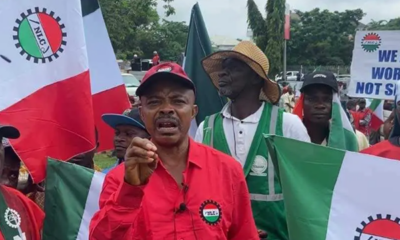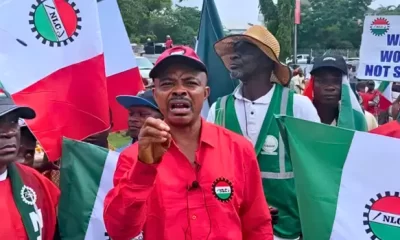Nigeria News
NLC begins mass mobilisation for subsidy removal protests

The Nigeria Labour Congress (NLC) has begun mass mobilisation of civil society organisations for the January 27 and February 1 nationwide protests against proposed removal of petrol subsidy by the Federal Government.
It has scheduled meetings in Lagos and Abuja this week with leaders of civil society groups ahead of the rallies.
In a letter to the President/General Secretary of its affiliate unions, the NLC directed its Central Working Committee members to be part of the meeting to reject plans by the government to remove subsidy from petrol.
According to the letter signed by NLC President, Comrade Ayuba Wabba and General Secretary, Emmanuel Ugboaja, the Abuja meeting will hold on Tuesday while that of Lagos will hold on Friday.
The Trade Union Congress (TUC) said its organs would meet from January 20 to 22 to take a position on the planned subsidy removal.
Its President, Comrade Quadri Olaleye, confirmed the meeting to our reporter on Sunday.
The NLC letter reads: “I bring you fraternal and season’s greetings from the Nigeria Labour Congress (NLC).
“Comrade, you may recall that at the regular meeting of the National Executive Council (NEC) of the Nigeria Labour Congress which took place on 17th December 2021at the Oyerinde Olaitan Auditorium, Pascal Bafyau Labour House, the NEC decided among other things to mobilise Nigerian workers and people for a nationwide protest on the 27th of January 2022 particularly in all the state capitals of the federation.
“There will also be national protest on the 1st of February 2022 in the Federal Capital Territory (FCT).
“The planned protest is to register the displeasure and rejection by Nigerian workers and people of the proposed plans by the government to increase the price of the Premium Motor Spirit (PMS) also commonly referred to as ‘petrol’.
“Currently, it is being speculated that the planned price hike would see liter of petrol sell between N340 and N360.
“Clearly, this price upsurge would unleash very severe and calamitous dislocation on Nigerian workers, people and businesses.
“In order to plan for an effective and peaceful protest, we seek the indulgence of your union as a member of the NLC Central Working Committee to be part of a planning meeting with leaders of CSOs scheduled to take place in both Abuja and Lagos State.
“While we look forward to your attendance, please accept the renewed assurances of our highest esteem.”
The TUC President said the National Administrative Council, Central Working Committee and National Executive Council would meet on January 20, 21 and 22 to take a position on the planned petrol removal.
He said: “The TUC will make its decision known on the 22 of January. We are having our organs meet from the 20th, 21th and 22nd. It is after that meeting that we will decide on what to do.
“The planned subsidy removal is a major issue that we will discuss. We have other issues like the failure of the government to implement the electricity tariff reduction agreement. We will look into it at the meeting. I don’t want to preempt the meeting.”
The Federal Government has failed to implement the N15 per kilowatt-hour agreement on electricity tariff reduction by December 2021.
A Technical Committee headed by Minister of State for Labour and Employment Festus Keyamo, had reached agreements on how to make the system work to the benefits of Nigerians.
Other members of the committee included: Minister of State Power, Godwin Jedy-Agba – member; Chairman, National Electricity Regulatory Commission, Prof. James Momoh – member and the Special Assistant to President Muhammadu Buhari on Infrastructure, Ahmad Rufai Zakari as Secretary.
Rufai could not be reached as of press time.
The NLC, had in a statement last year said: “Congress remains implacably committed to the ultimate reduction of electricity tariffs by N15 per kilowatt-hour by December 2021 as contained in the agreement. Congress hereby serves notice that the posture of the Federal Government to flout agreements is completely unacceptable and would be resisted.”





















